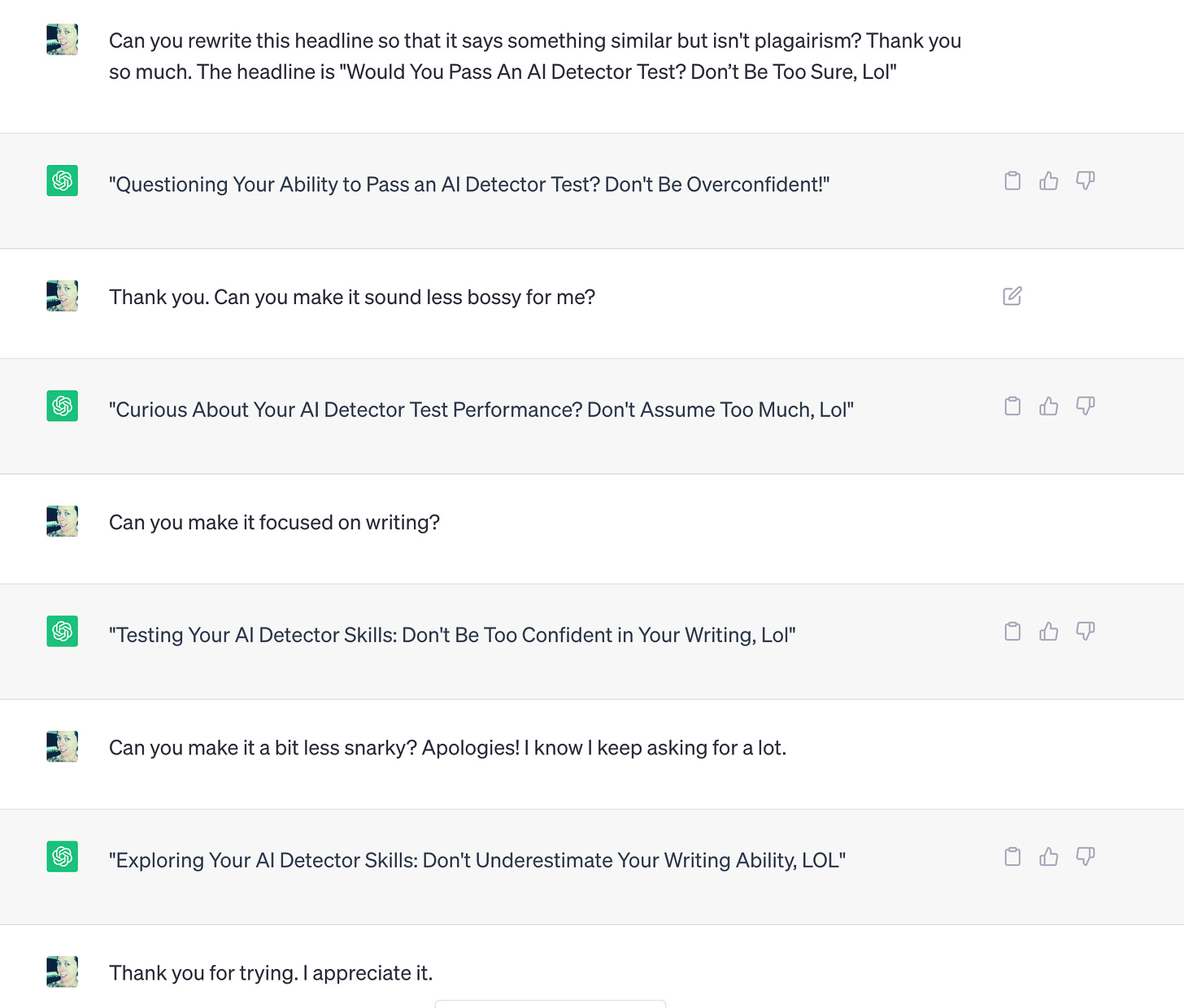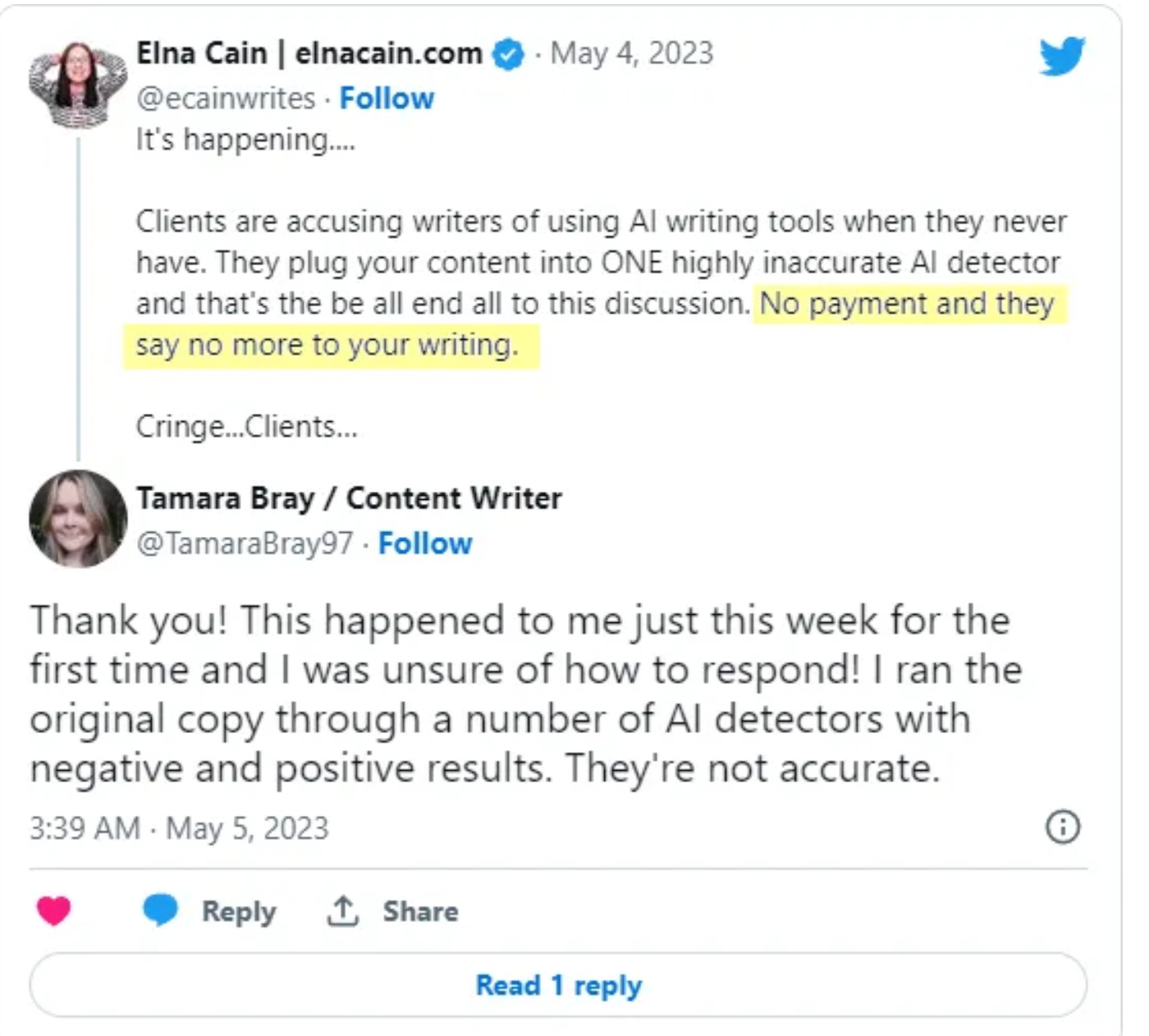WOULD AN AI DETECTOR THINK YOUR WRITING IS HUMAN?
Maybe? Maybe not? And should you want it to?
There’s a great post on Medium by Linda Caroll about whether or not us writers would pass an AI detector test.
She has. And in her subhead and it says, “Don’t be too sure, lol.”
I’m not so sure about the lol, honestly, but it’s a great article. And it made me think of the main thing that I’ve used AI for, which is headlines. Here’s our conversation over on ChatGpt
As we can see up there. It stayed bossy.
SO MANY THREATS
Okay, back to the Caroll story. It’s really pretty brilliantly done and so interesting. She definitely has a take in that she doesn’t think that AI’s biggest threat is plagiarism or putting us writers out of jobs.
She said that isn’t it.
She wrote:
“As it turns out, the real problem is way stupider.
Brace yourself.
Have you ever put your own writing into an AI detector? Until this week, I hadn’t. Why would I? I know I wrote it, I don’t need to check to see if I used ChatGPT. lol. How dumb. I know I didn’t use AI.
But you know what?
That overconfident attitude is getting people in big, big trouble.
This week, I ran across a bunch of freelance writers talking about clients running their writing through AI detection and refusing to pay them. The writers swore up and down they did not use AI.
But still. They failed the test. They’re not getting paid. Some got fired.
Wow. Ouch. That sucks.”
And the problem, she says, is that writers are failing the AI test with their articles and then their clients are refusing to pay them.
She says, “If we write like ourselves, we fail the dreaded AI test.”
Carol’s article creates an expectation that since AI learned to write from humans, then humans’ writing will be like AI when run through those detectors.
I ran her article through though and she got this:
So, is that article she wrote her not writing like herself?
It’s the same thing I get every single time I put anything of mine in there (blog posts, chapters, news articles).
So, writing like yourself means you’re writing like AI obviously isn’t true for everyone. It wasn’t true for her article. It wasn’t true for me. It has, however, been true for others.
Here’s a tweet she pulled:
And while I worry about AI, what I also worry about is the homogenization of writing, of blog articles that all sound the same, of novels that sound the same, of poems that sound the same. Of writing becoming a meme of itself. And that’s not just AI’s fault. It’s been a fault of the writing world for a long time. It’s a world that talks about cultivating distinctive voice and voices a lot, but often doesn’t publish or celebrate that diversity of voice, of sentence structure, of word choice, or experience.
Carol writes, and I agree,
“There’s a real irony to using AI detection tools in the first place. Because AI was trained on us. Literally. They fed it giant swaths of the internet to teach it how to write. Wikipedia, Gutenberg, Common Crawl, etc.
Which basically means AI learned to write from us.
Now if we write like ourselves, we fail the dreaded AI test.
It would be like training a robot to write just like Stephen King or Margaret Atwood and then, when the robot can emulate them sufficiently well, we turn around and criticize them for writing like a robot.
What a stupid world we’ve built.”
But again, it’s not just AI that’s done that. We’ve done that to each other. We have expectations of book structure, of blog posts, of poems. And it’s harder to be read when you don’t fit that structure.
So, here’s the thing: Be you in the real world and the writing world. Write like you. Talk like you. Use your hands when you explain things. Wear socks that don’t match. Comb your hair perfectly. Forget you have hair. Maybe shave it all off. Make your sentences long and punchy or mellifluous or malodourous. Just be you. Be you while you can.
And yes, the AI detector might think you’re not human. The positive? You probably could make a lot of money copy writing for companies? The negative? Maybe you’ve lost a tiny bit of your own style when you write that sort of copy.
And yes, the AI detector might know you are all human. The positive? Well, you are. And you’re probably distinctive. The negative? You might not be as easily published. But when you are? You’ll probably be straight fire. Because us people? We crave authenticity as well as familiarity. My hope is that we’ll start to remember that right now.
The GPTZero site hones in on the following two bits (perplexity and burstiness) as part of how it determines if you’re human. I’ve put a screen cap from this blog post’s study below.
I am pretty darn bursty.
WRITING EXERCISE
Go find something you wrote. Put it in GPT ZERO. See what it says.
PLACES TO SUBMIT
Salamander Fiction Prize
Eligibility: All writers
Prize: $1,000 + publication
Entry Fee: $15
Deadline: June 1, 2023
May Sarton New Hampshire Poetry Book Prize
Eligibility: All poets
Prize: $1,000 + publication
Entry Fee: $30
Deadline: June 30, 2023
New Millennium Writings Awards in Poetry, Fiction, Flash Fiction, Nonfiction
Eligibility: All writers
Prize: $1,000
Entry Fee: $20
Deadline: June 30, 2023









